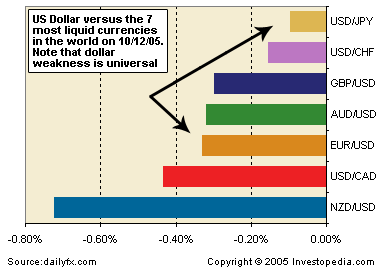The biggest money market in the world, Foreign Exchange or Forex or FX is a platform where money is sold and bought freely between buyers and sellers. With over $1.5 trillion USD being traded daily, the foreign exchange market has now become a market which is open to trading by an average investor as much as it is open to a high investor.
Launched over three decades back, in the early seventies, Market Forex introduced free exchange rates worldwide, according to which, the price of the currencies was determined on the basis of demand and supply only. No external regulatory authority was and still is, allowed to set or fix prices or rates.
The power of setting or fixing a price for each currency is with the participants of the market, the buyers or the sellers, who decide the price of one currency against the other.
Forex Market is also free and independent from all or any outside control and is open to all, as far as free and fair competition is concerned, making it the perfect market to invest in.
Today, Forex market deals in over hundred times the every day trading done in the New York Stock Exchange. The Forex market is an over-the-counter market in which buyers and sellers trade through different means of communication such as telephone, fax or internet network rather than being physically present on the exchange location.
The major reason for this is that contrasting to other money markets, the Foreign Exchange market neither has a physical location nor any central exchange. And it is this lack of physical exchange, which enables the Forex market to trades incessantly, 24 hours a day, going from one time zone to the other, from the world’s one major economic center to another, day after day.
Beginning since 1997 till date, more than a trillion dollars of foreign exchange activity has been taking place at Forex, day after day. The every day forex trading quantity escalated from US$5 billion to US$1.5 trillion approximately. At this pace, it can be said for sure that the Forex market continues to grow at an exceptional rate.
Going back to the time when Foreign Exchange market had been launched, before the Internet geared up its popularity, Forex was only limited to big companies, transnational or global banks and affluent corporate individuals, who could trade currencies in the market through the bank-owned trading systems.
During that time, opening an account for trading required a deposit of as much as US$1 million. It was only with the advent of Internet and online technology, that today, investors can open an account as well as trade successfully, with only a few thousand dollars.
Brokers are a significant part of this trading industry. It is only because of these Forex Brokers, that this Foreign Exchange market is a nonstop cash market, with a continuous buying and selling of currencies of different nations.
Forex market conditions are highly unpredictable in nature and change every second, with fluctuation in price being the only constant factor in this trading. This is the main reason why, at times, Forex is also known as a highly fickle and fragile market.
Forex today, provides a great substitute to the stock market trading for the traders and investors. Although Stock Exchange provides a far larger variety of stocks to trade in, Forex offers only a few major currencies to trade for, where in the US Dollar, Yen, British Pound, Swiss Franc, and Euro, are the most popular ones.
Trading such big currencies is definitely more exciting for the investors than the stocks, and it can be seen that more and more traders and investors are now turning towards Currency trading to get the real thrill of the trading business.



